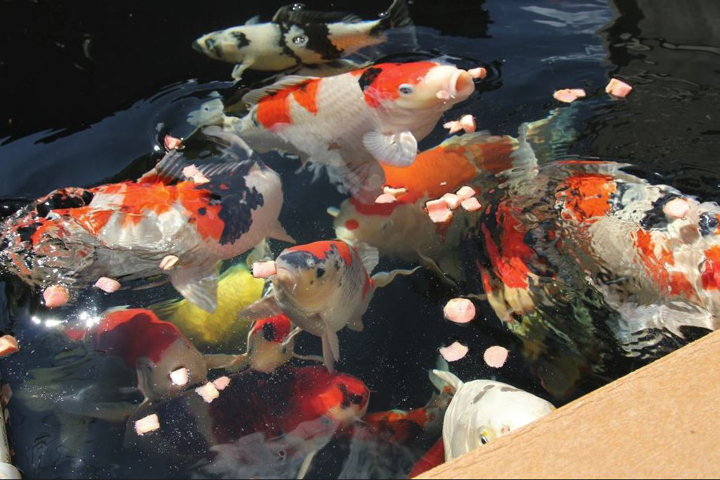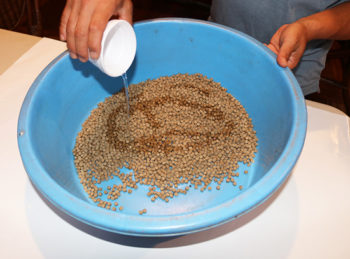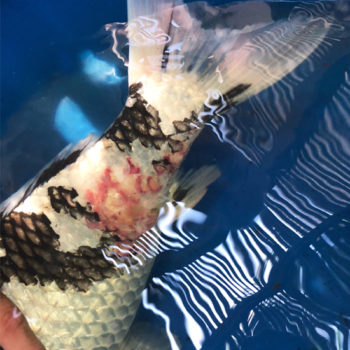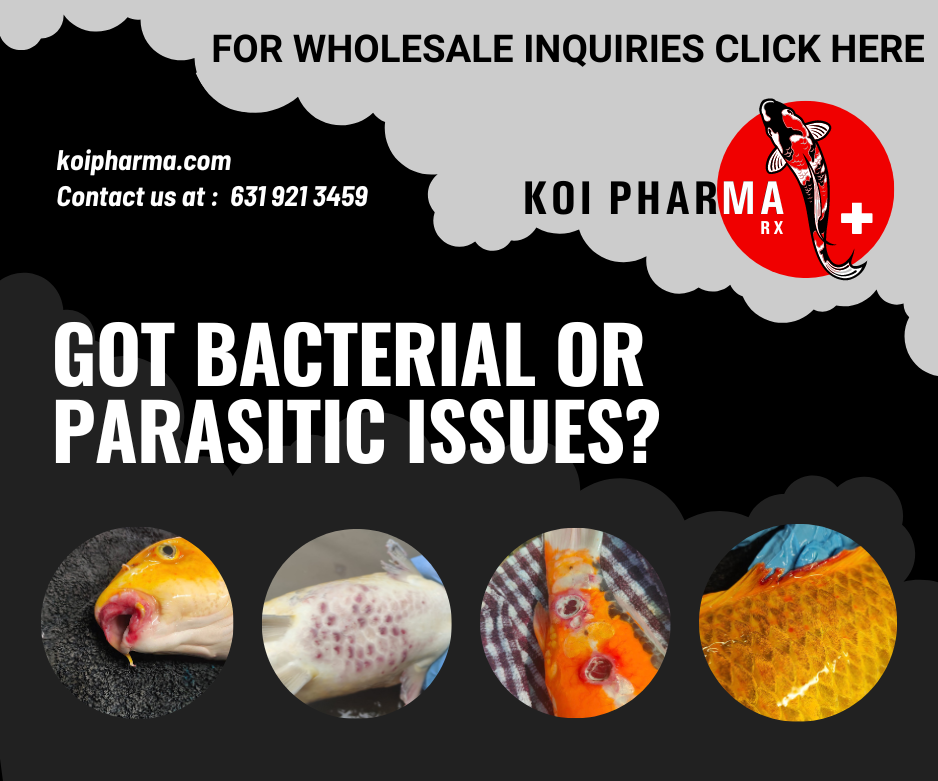
Koi medication isn’t a fun topic, but it can be a very important concept to understand as you work to maintain a healthy pond environment. Although most of the attention is focused on spring months when bacteria become more active, an outbreak can occur at any time. Be prepared so you don’t delay the necessary treatment.
At Kodama Koi Farm, my family’s farm, we use a variety of medications to treat parasites, bacteria and fungi for our high-quality Japanese koi for sale. Unfortunately, the production and sale of medicated koi food was banned by the FDA in 2017 in an effort reduce the overuse of antibiotics. Thus, the options are a bit more limited today than before.
Symptoms like popped eyes, raised scales, open wounds and rotten mouth and fins are typical of bacterial issues. If you have a parasite, the koi will flash, jump, or sit at the bottom of the pond.
Once you learn the issue is bacterial, you can inject your koi, put medicine in your pond or feed your koi with medicated food. While injection is probably the most effective, it is also the most expensive, and you’ll need to hire a vet in most cases.
Since medicated food is no longer on the market, we want to teach you how to make it at home! Here is the abridged version, but you can check out my website for the full details of how to make medicated koi food.
Start by preparing these items:
- Koi food
- Aquaculture antibiotics
- Bowl
- Cup of water
- Newspaper
- Ziplock bag

For example, I use Oxolinic acid powder for aquaculture antibiotics, because this is what I always use first when I treat our koi at our farm. You can also use Neomycin Sulfate Powder, which works well in freshwater or saltwater aquariums.
Keep in mind that medicated food will only take care of only bacterial issues, not parasite issues.
How to make 1 pound of medicated food:
- Put 1 lb. of koi food in a bowl.
- Dissolve 10 grams (2 teaspoons) Oxolinic acid powder in ½ cup of water, and then add up to ½ cup more water, little by little, as needed. Make sure the solution is neither too watery nor too pasty.
- Pour Oxolinic acid solution over the food in a bowl. Mix it well and thoroughly so that every pellet is covered with medicine.
- Mix koi food well with your hands, or use my favorite method — put the food and the solution in a container with a lid and shake it well. It will not get your hands dirty!
- Lay the food over newspaper in a cool, dry place. The food should be completely dry after 30 to 60 minutes.
- Put the food in a large, sealable plastic bag. Store it in a cool, dry place, like a refrigerator.
Voila! You now have homemade medicated food!

Its shelf life is about one to two weeks, depending on how you store it. Handmade foods can grow mold easily if not prepared and stored properly. which then do more harm than good.
I usually feed koi medicated food once per day. It is important that koi eat the food and that you make sure they stay hungry enough to eat it. If you feed other kinds of food at the same time, your koi may ignore the medicated food.
The best feeding practice is usually once a day for two weeks. Calculate how many pounds of koi food you need to prepare. Or, for the ease of preparing and storing the food, it may be good to make the food 1 pound at a time.
You can add supplements to help koi recover more quickly. Billion Pro Original is my favorite additive whenever we make the medicated food. These medicines are usually bitter, but they are very strong for their internal system. If you’ve ever taken medicine yourself, I think you can relate to that.
Here are some more helpful links and products for koi food medication:
- Kodama Koi Remedy Package
- Oxolinic acid powder
- Billion Pro Original
- Neomycin Sulfate Powder
- Ich-X
- Prazi
- 300 Gal Koi Quarantine Tank
I hope this information has been valuable. You are now ready to produce your own medicated koi food! Go ahead and have the ingredients ready and available so there is no delay when you see the first signs of a bacterial infection.



what is the shelf life of the unused medicine?
Hello,
The already mixed medicated food will not last long. Even if it is stored well, I recommend you finish it within a few weeks. If you are talking about medicine itself, I believe it depends on which chemical you use. I suggest you ask your supplier of the chemical. When I have it myself, I try to use it within a few years.
I used metrodanizole for fish for bacterial and protozoa parasites